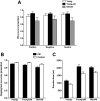Prospective memory function in late adulthood: affect at encoding and resource allocation costs
- PMID: 25893540
- PMCID: PMC4404251
- DOI: 10.1371/journal.pone.0125124
Prospective memory function in late adulthood: affect at encoding and resource allocation costs
Abstract
Some studies have found that prospective memory (PM) cues which are emotionally valenced influence age effects in prospective remembering, but it remains unclear whether this effect reflects the operation of processes implemented at encoding or retrieval. In addition, none of the prior ageing studies of valence on PM function have examined potential costs of engaging in different valence conditions, or resource allocation trade-offs between the PM and the ongoing task. In the present study, younger, young-old and old-old adults completed a PM task in which the valence of the cues varied systematically (positive, negative or neutral) at encoding, but was kept constant (neutral) at retrieval. The results indicated that PM accuracy did not vary as a function of affect at encoding, and that this effect did not interact with age group. There was also no main or interaction effect of valence on PM reaction time in PM cue trials, indicating that valence costs across the three encoding conditions were equivalent. Old-old adults' PM accuracy was reduced relative to both young-old and younger adults. Prospective remembering incurred dual-task costs for all three groups. Analyses of reaction time data suggested that for both young-old and old-old, these costs were greater, implying differential resource allocation cost trade-offs. However, when reaction time data were expressed as a proportional change that adjusted for the general slowing of the older adults, costs did not differ as a function of group.
Conflict of interest statement
Figures
Similar articles
-
Prospective memory, emotional valence and ageing.Cogn Emot. 2011 Aug;25(5):916-25. doi: 10.1080/02699931.2010.508610. Epub 2011 May 24. Cogn Emot. 2011. PMID: 21824029
-
Emotional valence differentially affects encoding and retrieval of prospective memory in older adults.Neuropsychol Dev Cogn B Aging Neuropsychol Cogn. 2015;22(5):544-59. doi: 10.1080/13825585.2014.1001316. Epub 2015 Jan 29. Neuropsychol Dev Cogn B Aging Neuropsychol Cogn. 2015. PMID: 25633458
-
Investigating prospective memory via eye tracking: No evidence for a monitoring deficit in older adults.Int J Psychophysiol. 2019 Dec;146:107-116. doi: 10.1016/j.ijpsycho.2019.09.004. Epub 2019 Oct 23. Int J Psychophysiol. 2019. PMID: 31655183
-
[Prospective memory in normal aging and Alzheimer's disease].Psychol Neuropsychiatr Vieil. 2008 Dec;6(4):277-86. doi: 10.1684/pnv.2008.0150. Psychol Neuropsychiatr Vieil. 2008. PMID: 19087909 Review. French.
-
Aging and motivated cognition: the positivity effect in attention and memory.Trends Cogn Sci. 2005 Oct;9(10):496-502. doi: 10.1016/j.tics.2005.08.005. Trends Cogn Sci. 2005. PMID: 16154382 Review.
Cited by
-
The mapping between transformed reaction time costs and models of processing in aging and cognition.Psychol Aging. 2018 Nov;33(7):1093-1104. doi: 10.1037/pag0000298. Epub 2018 Oct 8. Psychol Aging. 2018. PMID: 30299155 Free PMC article.
-
Emotion and prospective memory: effects of emotional _targets and contexts.Psychol Res. 2024 Apr;88(3):987-1006. doi: 10.1007/s00426-023-01903-y. Epub 2023 Dec 26. Psychol Res. 2024. PMID: 38147076
References
Publication types
MeSH terms
Grants and funding
LinkOut - more resources
Full Text Sources
Other Literature Sources
Medical


